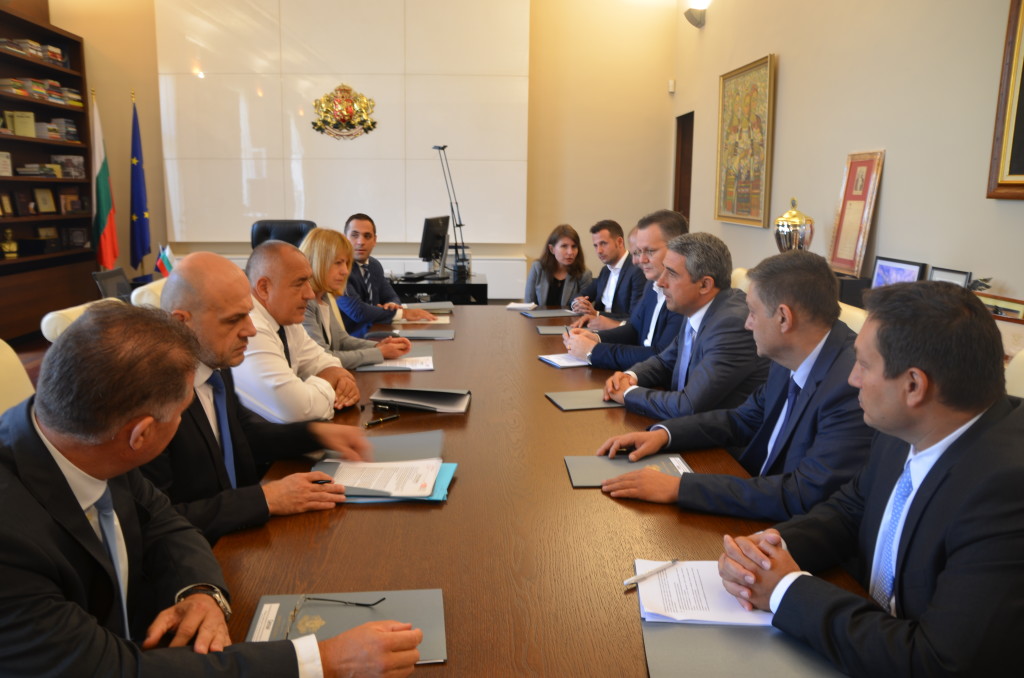Decisions of a meeting of the Prime Minister of the Republic of Bulgaria Boyko Borisov and Automotive Cluster Bulgaria
Participants from the Bulgarian Government: Boyko Borisov (Prime Minister), Yordanka Fandakova (Mayor of Sofia), Tomislav Donchev (Deputy Prime Minister), Vladislav Goranov (Minister of Finance), Emil Karanikolov (Minister of Economy)
Participants from ACB: arch. Lyubomir Stanislavov, Ivan Mihaylov (Visteon), Milen Raykov (EY), Plamen Mitev (Vienna Real Estate), Rosen Plevneliev (President of the Republic of Bulgaria 2012-2017), Stefan Ivanov (FESTO) and Tommy Ver Elst (Sensata)

17 July 2019, Sofia – Council of Ministers
- Partnership between Automotive Cluster Bulgaria and the Government of Bulgaria: The Automotive Cluster Bulgaria was established in 2012 with the main long-term goal of attracting strategic OEMs in Bulgaria and accelerating development of the automotive industry in Bulgaria, or in other words creating modern factories for automobile production in the country. The interest of world-known companies such as Volkswagen, Hyundai, PSA (Peugeot), BMW, FAW, Daimler and others is largely provoked by the activity of Automotive Cluster Bulgaria in Bulgaria and abroad. Successfully attracting the Bosch Automotive R & D Center in Sofia (from Belgrade) was a keystone moment in 2018. Automotive Cluster Bulgaria would be a key and institutionalized partner of the Bulgarian Government to attract investors in the automotive industry with the aim of creating 3-4 automotive plants in Bulgaria, centered in different cities such as Sofia, Plovdiv, Burgas, Blagoevgrad, Rousse, Vidin and others. As a result of this strategy, we expect the number of component manufacturers in Bulgaria to grow to over 500 companies (currently 250) with an annual turnover of more than 25 billion euros (currently 5.5 billion euros). The theme of building a large car factory is one of the few strategic goals that unite the whole of society, regardless of political affiliation, gender or religion. In this sense, the theme is in fact an informally formulated national priority;
- Improving the communication between Automotive Cluster Bulgaria and the Government of Bulgaria: In almost all other countries, automotive clusters are either government structures or clearly government-backed organizations with a mandate to hold talks and state policy in their respective spheres.
- Institutionalization of ACB: Automotive Cluster Bulgaria as an associate or full partner in the National Tripartite Cooperation Council. ACB will protect the interests of the automotive industry (which has the potential to reach a minimum 25% share of the Bulgarian economy over the next 5 years). This will allow ACB to address larger projects, accelerating the development of the automotive industry in Bulgaria in the field of mobility of the future (electric, autonomous and related vehicles);
- A Strategy for the Development of the Automotive Industry in Bulgaria: The Bulgarian Government and Automotive Cluster Bulgaria to prepare a proposal for a strategy for accelerated development of the automotive industry in Bulgaria. Specific projects related to the mobility of the future can also be identified, such as:
4.1. Autonomous Driving: Creating a test track for autonomous vehicles.
4.2. 5G Lab: Joint creation and management of the first experimental 5G Laboratory on the territory of Sofia Tech Park to work in synergy with the planned data center with a supercomputer back there. Technology is vital to all companies that develop autonomous driving technologies that require huge amounts of data to be exchanged.
4.3. More added value from the Bulgarian automotive industry: Establishing incubation programs that stimulate more Bulgarian companies to enter the system of automotive suppliers, the first successful examples are already in place.
4.4. Ad-hoc support for large Tier 1 vendors.
4.5. The Square – Automotive R&D Center в Sofia Tech Park. Creation of a center of national importance for software development in the world of connectivity and autonomous management.
4.6. Incentives for the production, distribution and use of electric vehicles.
- Legislative initiatives: Together with the Bulgarian government, Automotive Cluster Bulgaria would initiate changes to the following laws:
5.1. R&D initiative: introducing additional tax incentives for development companies;
5.2. Amendments to the Labor Code;
5.3. Change of legislation to allow tests for autonomous vehicles;
5.4. Amendments to the Investment Act in Bulgaria;
5.5. Amendments to the Telecommunications Act in connection with the authorization of test frequencies for 5G networks.
- Initiatives related to advertising, finding and creating qualified personnel for the automotive industry: Automotive Cluster Bulgaria coordinates the HR activities of automotive companies through regular meetings and conferences on the subject. In this sense, a much more focused policy is needed to advertise the automotive industry and create skilled workers.
6.1. Technical high-schools, with profile Mechatronics. In this process a key role is played by the Technical University Sofia, with which the ACB already has joint projects. Co-operation with International Universities, such as Vienna Technical University (https://www.tuwien.at/), a member of Automotive Cluster Bulgaria.
6.2. Partnership with the Ministry of Education in order to accelerate the development of the dual education program in Bulgaria, leading companies in this area for ACB members, such as FESTO, Standard Profile and others.
6.3. Identification of specific technical schools in cities such as Sofia, Plovdiv, Burgas, Ruse, Vidin, Vratsa and others and launch specific programs with them.
6.4. Implementation of regional competence centers in the city of Vidin, Burgas, Sofia, Plovdiv, Varna and Blagoevgrad.